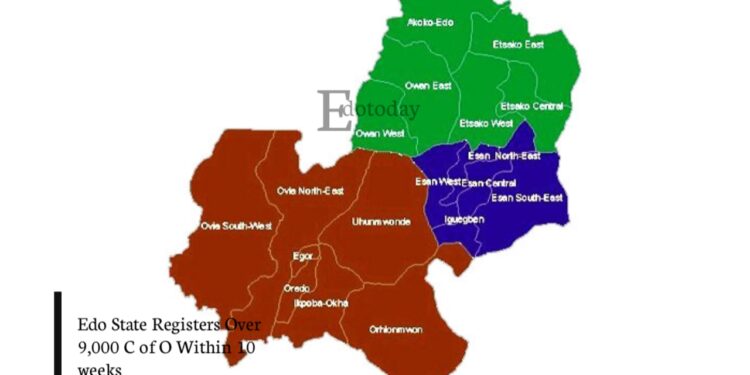Between February and April 17, 2025, the Edo State Government recorded more than 9,000 Certificates of Occupancy, which is a major milestone for the state’s property rights and land paperwork.
During a courtesy visit by journalists on Easter Sunday, Dr. Tony Ikpasaja, the Managing Director of the Edo State Geographic Information Service, revealed this.
Ikpasaja credited the noteworthy advancement to the implementation of a new digital system that Governor Okpebholo’s administration unveiled in January 2025. This action came following the collapse of the old digital infrastructure deployed during the government of former Governor Godwin Obaseki.
“As of today, I can boldly tell you that we have captured and processed over 9,000 files for Certificates of Occupancy. We have also been signing and issuing them out,” he stated.
He compared this success with the performance of the previous administration, which, according to him, processed just roughly 1,000 C of Os between 2023 and February 2025.
Ikpasaja observed that EdoGIS inherited approximately 7,500 unmanaged files belonging to petitioners seeking land registration. In the upcoming weeks, he promised the public, those outstanding applications will be processed.
“It is disheartening that people paid for registration and their files were left unattended. Within the next few weeks or months, we will clear the backlog and give Nigerians and Edo people their rightful Certificates of Occupancy,” he said.
EdoGIS has also purchased more advanced equipment to increase efficiency and speed up the application procedure in order to strengthen the agency’s capabilities.
Ikpasaja emphasized how crucial it is to obtain Certificates of Occupancy in order to legalize property, cautioning that any land lacking one is not considered a legitimate asset.
“Our system ensures that once your certificate is in process, your land is secure—no one else can process a C of O on that land,” he added.
He emphasized that EdoGIS’s new organizational structure now follows global best practices, including World Bank-recommended guidelines.
“What we have today does not give room to hoard files. We are committed to transparency and efficiency,” he stated.












